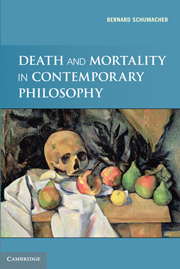Book contents
- Frontmatter
- Contents
- Preface
- Introduction
- Part One Human Personal Death
- Part Two Theory of Knowledge About Death
- 2 Scheler’s Intuitive Knowledge of Mortality
- 3 Heidegger’s Being-Towards-Death
- 4 Is Mortality the Object of Foreknowledge?
- 5 Inductive Knowledge of Death and Jean-Paul Sartre
- 6 Knowledge of Mortality Is Inseparable from the Relation to the Other
- 7 Death as the Object of Experience
- Part Three Does Death Mean Nothing To Us?
- Conclusion
- Bibliography
- Index of Names
- Index of Concepts
4 - Is Mortality the Object of Foreknowledge?
Published online by Cambridge University Press: 05 June 2012
- Frontmatter
- Contents
- Preface
- Introduction
- Part One Human Personal Death
- Part Two Theory of Knowledge About Death
- 2 Scheler’s Intuitive Knowledge of Mortality
- 3 Heidegger’s Being-Towards-Death
- 4 Is Mortality the Object of Foreknowledge?
- 5 Inductive Knowledge of Death and Jean-Paul Sartre
- 6 Knowledge of Mortality Is Inseparable from the Relation to the Other
- 7 Death as the Object of Experience
- Part Three Does Death Mean Nothing To Us?
- Conclusion
- Bibliography
- Index of Names
- Index of Concepts
Summary
We have discussed the thesis that there is an intuitive knowledge of death, as well as the ontological approach that posits a priori an intrinsic end to the straining forward of Dasein. Let us consider for a moment the philosophers who propose a “constitutive knowledge” or a “foreknowledge” of mortality. In his book entitled Death and Thought, Conche emphasizes that the statement “I shall die” contains an absolute certainty, a “deep-seated conviction” (“conviction foncière”) that is not based on certain knowledge and is not something proved by deductive reasoning but depends on the “general or widely held opinions” of the average human being, on “accepted ideas (endoxa)”. It constitutes a “primary truth” that is “bound up with a feeling of insurmountable [and irremediable] helplessness”, which is in turn connected with “the sense of being a part of nature and of sharing a common lot”. The knowledge of my mortality – that universal and “all-powerful” law of nature – lies especially in what Conche calls a “consciousness of materiality”, meaning that I, as a material being, am profoundly affected by the principle of dissolution. The origin of the fact that I know that I am mortal cannot be found in knowledge that is understood in the sense of objective knowledge that has been acquired. At issue here is a knowledge that Conche calls “constitutive”, that is, “which has always been there, that is one with [one]self”. I could not conceive of myself not knowing that. For Conche the fact of being conscious of oneself implies the fact of thinking about oneself as mortal. ‘I think of myself, therefore I am mortal,’ one could say; or rather, to be more precise, ‘I think of myself’ is identical to ‘I think of myself as being mortal’. “From the moment that I am conscious – and this is what distinguishes me from an animal or an infant that cannot yet speak –, for example, from the moment that I wake up in the morning, I think myself, and that means: I think myself mortal. I cannot think without being conscious of it, and I cannot be conscious without thinking of myself. Now to think of myself and to think of myself as mortal are one and the same thing. Consequently every thought develops against the background of a knowledge of death. Death, as such, is the horizon of thought. We return to a sort of cogito, but such that the body, instead of being excluded from knowledge, is included in it. There is no such thing as a thought about myself that is not at the same time a thought about myself as mortal”.
- Type
- Chapter
- Information
- Death and Mortality in Contemporary Philosophy , pp. 85 - 90Publisher: Cambridge University PressPrint publication year: 2010

